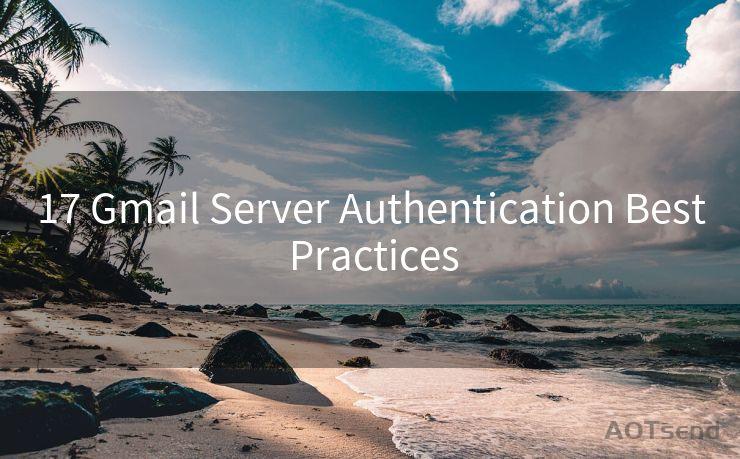17 Gmail Server Authentication Best Practices




When it comes to email communication, security is paramount. Gmail, as one of the most popular email services, offers robust security features. However, to ensure maximum protection, it's crucial to follow best practices for server authentication. In this article, we'll explore 17 essential Gmail server authentication best practices that will help you secure your email communication.
1. Enable Two-Factor Authentication
Two-factor authentication (2FA) adds an extra layer of security to your Gmail account. With 2FA, you need both your password and a second form of verification, such as a code sent to your phone, to log in.
2. Use a Strong and Unique Password
Creating a strong and unique password for your Gmail account is vital. Avoid using common words or phrases and mix uppercase, lowercase, numbers, and symbols.
3. Keep Your Software Up to Date
Always ensure your browser, operating system, and any related software are up to date. This helps protect against known vulnerabilities.
4. Be Cautious of Suspicious Emails
Never click on links or open attachments in suspicious emails. These could be phishing attempts to steal your credentials.
5. Utilize Gmail's Secure Connection

Always access your Gmail account via a secure connection (HTTPS). This encrypts the data transmitted between your device and Gmail's servers.
6. Regularly Review Account Activity
Regularly check your Gmail account activity to spot any unusual or unauthorized access attempts.
7. Configure Your Account for Maximum Security
In your Gmail settings, enable the most secure options available, such as blocking less secure apps and allowing only specific apps to access your account.
8. Use a VPN for Public Networks
When accessing Gmail from public networks, use a Virtual Private Network (VPN) to encrypt your connection and hide your IP address.
9. Avoid Using Public Computers for Sensitive Emails
If possible, avoid checking sensitive emails or performing critical tasks on public computers.
10. Log Out When Finished
Always log out of your Gmail account when you're finished using it, especially on shared or public computers.
11. Monitor Your Forwarded Emails
If you have email forwarding set up, regularly monitor where your emails are being forwarded to ensure they're not ending up in unauthorized hands.
12. Consider Using an Email Encryption Service
For extra security, consider using an email encryption service that encrypts the content of your emails.
13. Back Up Your Important Emails
Regularly back up your important emails to prevent data loss in case of any security incident.
14. Be Mindful of What You Share
🔔🔔🔔
【AOTsend Email API】:AOTsend is a Managed Email Service for sending transactional emails. Support Email Types: reminders, authentication, confirmations, notifications, verification codes, invoices, password resets, account activations, billing statements, two-factor authentication (2FA), and one-time passwords (OTP) emails, etc. $0.28 per 1000 Emails. 99% Delivery, 98% Inbox Rate.
You might be interested in:
Why did we start the AOTsend project, Brand Story?
What is a Managed Email API, How it Works?
Best 25+ Email Marketing Platforms (Authority,Keywords&Traffic Comparison)
Best 24+ Email Marketing Service (Price, Pros&Cons Comparison)
Email APIs vs SMTP: How they Works, Any Difference?
Avoid sharing sensitive personal or financial information via email, as it can be intercepted.
15. Use Gmail's Advanced Security Features
Explore and utilize Gmail's advanced security features, such as confidential mode and email delegation, to further protect your account.
16. Educate Yourself on the Latest Security Threats
Stay informed about the latest email security threats and how to protect yourself from them.
17. Consider Using a Separate Email for Sensitive Information
If you regularly handle sensitive information, consider setting up a separate, more secure email account for those communications.
By following these 17 Gmail server authentication best practices, you can significantly enhance the security of your email communication and protect yourself from potential threats. Remember, security is an ongoing process, so stay vigilant and adapt your practices as new threats emerge.




Scan the QR code to access on your mobile device.
Copyright notice: This article is published by AotSend. Reproduction requires attribution.
Article Link:https://www.mailwot.com/p4788.html



